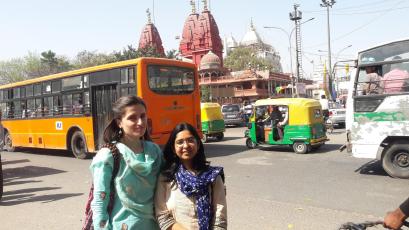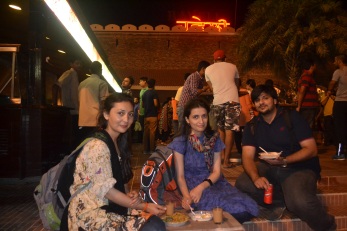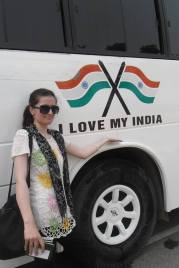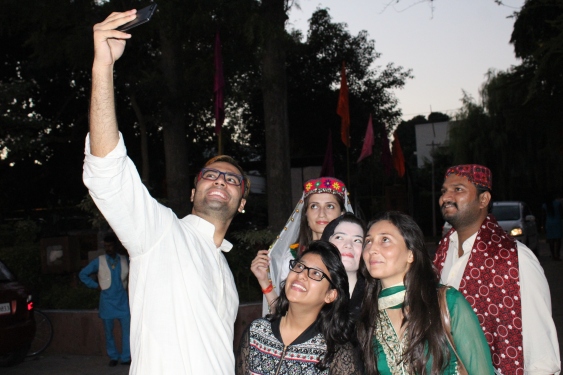Article: When My Enemies Became My Saviors
Posted by aaghazedosti
by Aliya Harir (Pakistan)
‘Dad, where will you take us, if India attacks Pakistan?’
I asked my father on return from school when my teacher read newspaper headlines to our class, of a germinating war between India and Pakistan. I was scared dreading exchange of those missiles we had seen on TV. I was in the 5th grade only.
I heard growing up that India funds for carrying out violent activities in Pakistan. India funds massacres of Muslims in its own land and makes their living stringent. The weekly program about Kashmir on Pakistan Television (PTV) reinforced the image. No alternate perspective was available except when dad replied that the Indians he had met and lived with, in Australia, were nice people. One lesson, however, from father weighted lesser than those taught by textbooks, media, and the popular discourse. They indoctrinated hate for India. Quite simply loving Pakistan meant hating the enemy – India.
Cricket matches invoked more hatred and jingoism. I always supported two teams: Pakistan, and the one playing against India. In the Cricket World Cup 2011, Pakistan lost the semifinal match to India. For the final match, I was supporting Sri Lanka. Of course! But quite off the mark India won. Like every desi, I promised not to watch cricket again, but unlike other desis I have kept that promise. I still do not watch cricket match but I am interested in the result: has Pakistan won, has India lost? The bruises were still fresh when I was selected to attend an exchange program in the United States in the same year. The first Indian I met on the foreign soil asked me: “Cricket daikhte ho aap? (Do you watch cricket?)” and I lost my cool. I unabashedly dropped bad remarks about the Indian cricket team, intentionally wanting the conversation to take an unpleasant mode. I felt so proud of blowing my country’s enemy off. I told another Pakistani friend, of what I did, who was equally proud of me.
Six months into the exchange program, I met so many Indians in Alabama. The more I interacted with them, the more I realized how much we had in common. We shared much more than our common history: similar foods, dressing, languages, and even friendly abuses. The love for bollywood movies was the greatest connection of all. As our friendship grew up, I was invited by other Indian friends for Diwali and Eid celebrations. However, during some of the get-togethers, a few people indicted Pakistan of mistreating Hindus and supporting separatist movements in India. I was not offended of their ignorance. Perhaps their parents had also failed against their child’s textbooks, media, and the popular discourse. The Indian friends I made often brought desi food and always asked after me if I was fine. They also assured that the Indian families will be a call away in case of any trouble.
I spent another Eid with friends from Arab and Middle East but kept missing that bond and connection that was a thing of only the Indo-Pak gatherings. On the exchange program, I fell ill and was hospitalized for a month. In the hospital, hundreds of people came to visit. It no more surprised me that most of those who helped me throughout my illness were from two countries: my beloved country Pakistan, and the rival country India! I could not develop taste for the hospital food. The Indian friends went out of their way to bring me desi food a number of times. They kept in touch with my father back home and updated him of my situation. Even Indian doctors who were not dealing with my particular medical case and Indian visitors of other patients came to visit when they heard that a Pakistani is admitted in the hospital.
All of this made very strong interventions in my perception of the enemy. I was an accounting major during the exchange program. It wasn’t long before I realized my capacity for change is greater if I took up social sciences. Back home in 2012, I not only enrolled for a degree in International Relations, but also met more Indians via social media specially through the Aman ki Asha public discussion group on facebook. I was always a silent observer. For days so on and so forth, discussions in the group among common people from both were so inspiring. I evolved a lot seeing people so utterly devoted to ensuring that the war finds no space between people of India and Pakistan. When I read accounts of people visiting the other side of the border, I understood how important it was to have first-hand interactions and that how my one-to-one interactions shaped me into who I was. My experience living with Indians further inspired me to work towards bridging gaps and building peace between the people of India and Pakistan. I came across many other groups and people on social media which is how I became part of an indopak friendship initiative, Aaghaz-e-Dosti (literal meaning beginning of friendship) that I now head from Pakistan as convener.
It was during the Indian elections that in a course ‘Politics of India’ at Quaid-i-Azam University, I was to represent the position of the BJP. I researched the party’s manifesto & electoral position, articulated my view in front of others in my counterparts, and tried convincing my fellows to support my position. I also represented India during a Model Shanghai Cooperation Organization Summit. These presentations often became the epicenter of off-the-classroom discussions at the school when my friends representing Pakistan and I (as India) were unsupportive of each other’s positions. We invoked in the presentations a sense of rivalry and competition towards each other, all in the spirit of fun. It was no less than a-dream-come-true when I got invited to attend a peace conference in Chandigarh, India. I instantly applied for visa and had no idea about the visa hurdles between India and Pakistan. I, thus, was not worried at all about it and luckily got my visa within 13 days. My father took slight convincing to allow me to go but finally he was very happy  with my decision. I was carrying no bad feelings or stereotypes and quite expectedly I was showered with hospitality, love, and care. During my first visit, I lived with a Sikh host family who treated me as their own daughter and it could not be more gratifying.
with my decision. I was carrying no bad feelings or stereotypes and quite expectedly I was showered with hospitality, love, and care. During my first visit, I lived with a Sikh host family who treated me as their own daughter and it could not be more gratifying.
Followed by this, I went to India three more times. I recently lived at my best friend’s home in Delhi where she showered me with love and care and her mom filled me with delicious food morning to evening. The first year of my visit, I stopped outside a temple near Chandni Chowk in Delhi watching the evening summon for Hindu prayers. It gave me goose bumps. My friend told me that ‘just like Muslims have azaan before namaz; the temple bell is rung prior to arti to inform devotees to rush for arti darshan’. I took my shoes off and peeped into the dimly-lit prayer hall from the porch. We slipped off in a while before which I stood there wishing they sung Om Jai Jagdish Hare so that I could join them. From years, I sang the Bhajan along whenever it played on TV and knew the whole lyrics by heart. I had never visited a temple or gurdwara in Pakistan, so this summon was the only new thing for me.
When I had the opportunity of hosting some friends from India in Islamabad and Lahore, I witnessed them being showered with love and warmth by common people when they  told they are Indians. If it were not for the difficult borders, common people would surely know that those on the other side are also like us. They share our struggles, our aspirations, and dreams. They want to live in peace and a world free of terror & filled with love as much as we want. I have visited Agra, Ajmer, Amritsar, Chandigarh, Delhi, and Jaipur so far and am already preparing for the fifth visit. Every time I make the news of my visit public, the average reaction comes knocking with vehemence: “dimagh kharab hai?”, “pagal ho?”, “India bhee koi jata hai?”, “zinda wapas aana”, “abi halaat nahi theek, baad mai jaana”. People try to strengthen the fear of something they have not even seen. But I now have come to the realization that every time I crossed the boundaries of fear I found love on the other side.
told they are Indians. If it were not for the difficult borders, common people would surely know that those on the other side are also like us. They share our struggles, our aspirations, and dreams. They want to live in peace and a world free of terror & filled with love as much as we want. I have visited Agra, Ajmer, Amritsar, Chandigarh, Delhi, and Jaipur so far and am already preparing for the fifth visit. Every time I make the news of my visit public, the average reaction comes knocking with vehemence: “dimagh kharab hai?”, “pagal ho?”, “India bhee koi jata hai?”, “zinda wapas aana”, “abi halaat nahi theek, baad mai jaana”. People try to strengthen the fear of something they have not even seen. But I now have come to the realization that every time I crossed the boundaries of fear I found love on the other side.
 The exchange program was a watershed in my life. It was an eye-opener to how Indian and Pakistanis are living peacefully in other countries calling themselves ‘desis’. The way my enemies had become my saviors in a third country has left me strongly convinced for the rest of my life that ‘if this is how enemies (I was taught to hate) are, I don’t need friends anymore’.
The exchange program was a watershed in my life. It was an eye-opener to how Indian and Pakistanis are living peacefully in other countries calling themselves ‘desis’. The way my enemies had become my saviors in a third country has left me strongly convinced for the rest of my life that ‘if this is how enemies (I was taught to hate) are, I don’t need friends anymore’.
I don’t want my daughter to come to me asking “where would I take her if India attacks Pakistan?” I don’t want a future for my child where she would dread a war with India. I don’t want her to take pride in bashing and hating a human being outside her country. I want a future for my child that is not ruined by the fear of war with and hatred for an enemy (who actually turns out is a very loving friend). Do you?
 Aliya Harir served as the Convener (Pakistan) of Aaghaz-e-Dosti (September 2013 – May 2017). She is the Youth Director of Pakistan – US Alumni Network and also serves as the International Board Member for Global Youth Peace Fest, Chandigarh. She tweets @AliyaHarir
Aliya Harir served as the Convener (Pakistan) of Aaghaz-e-Dosti (September 2013 – May 2017). She is the Youth Director of Pakistan – US Alumni Network and also serves as the International Board Member for Global Youth Peace Fest, Chandigarh. She tweets @AliyaHarir
About aaghazedosti
Aaghaz-e-Dosti is an Indo-Pak Friendship InitiativePosted on June 11, 2016, in Articles, Cross-Border Travel Stories. Bookmark the permalink. 4 Comments.




Salam Aliya,
I truly loved your blog I agree with you 100%.
Keep up the good work and God bless you
Peace
Nasir
LikeLike
Thanks Nasir Khan ji. Support and encouragement from people like you is what keeps us going.
LikeLike
You are very welcome Aliya, we need more people like you to carry on this super important work for peace. May God bless you and keep you safe, Ameen.
I am not sure how, but if there is any way I can help and/or participate in the process let me know. Thanks
Nasir
LikeLike
Hi Aliya,good work. next time come to Pune too
LikeLike